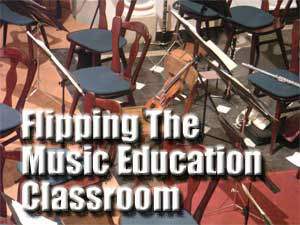The concept of the flipped classroom is growing in popularity across the country as more and more schools adopt the common core. While we in music education are probably more "flipped" than most other classrooms we still resort to a traditional model where a teacher essentially lectures, demonstrates, then tells the student to go practice and come back in a week to prove they have learned it. That's not exactly the same thing...
In a flipped classroom the teacher acts primarily as a moderator, providing activities that help the student learn on his or her own. In essence, letting the student teach himself and thereby master the material more fully. How do we break with hundreds of years of tradition and "flip" our music education classroom to be more student centered? For many people it may require that we also flip our expectations of what we need to do in small group and private instrument lessons.
Flipping Your Private and Small Group Lessons
In order to flip the music education classroom you have to switch your way of thinking from the very first day of classes. A student centered classroom is student driven, therefore the drive to practice and improve should primarily come from the student desiring it rather than from the teacher, demanding it. This mythical Nirvana where students actually want to practice and enjoy doing it is one that all of us as teachers dream of but that few ever get to experience.
To start the seeds of this long term intrinsic motivation we should be encouraging the student to take the lead, even if it is a private, one-on-one lesson. Instead of launching the student into warm-ups, exercises, and etudes that you have predetermined begin instead by shifting ownership and control of the lesson to the student. As an example, the band director of the Humbolt High School Band in Humboldt, Iowa suggests that you say something like, "Good morning Sally, what do you need to work on this week during our lesson?" This simple statement immediately kicks the student's thinking into the top level of the new Bloom's Taxonomy by making them analyze their own learning.
If you are concerned that students will not react well to this new method or if you find their responses to your flipped questions to be shallow in depth consider adding another part of Bloom's by recording and then having the student analyze their performances during the lesson. Start with simple, single answer questions like "was that piano or forte?" or "did we play any wrong notes in there?" As the student becomes more and more comfortable with evaluating their own performance their vocabulary and depth of responses will grow as well, leading them to take more and more ownership of the lessons and of their education as a whole.
Please realize that flipping your band classroom does not mean that the student controls every aspect of the lesson. The teacher still guides the student, pushing them gently down the path that leads to the skills they need to master. Essentially the teacher does the same thing they always have done, providing the music that will help them develop their abilities, but instead of assignments coming as a decree from the teacher they come as a response to the student's request for help. Flipping this simple but powerful switch to the way lessons are perceived by the student can change the idea of lessons from something potentially negative (ie. getting yelled at for not practicing) to something potentially positive (being proud to demonstrate what they have worked hard to learn).
As the student matures as a musician they can slowly begin to take more control of the lessons when you begin with the impetus statement of "what do you need to work on this week." Once you have coached your students into realizing their own deficiencies and provide them with adequate support to overcome them musically not only will their playing improve but their practice time and interest in the instrument will improve as well.

